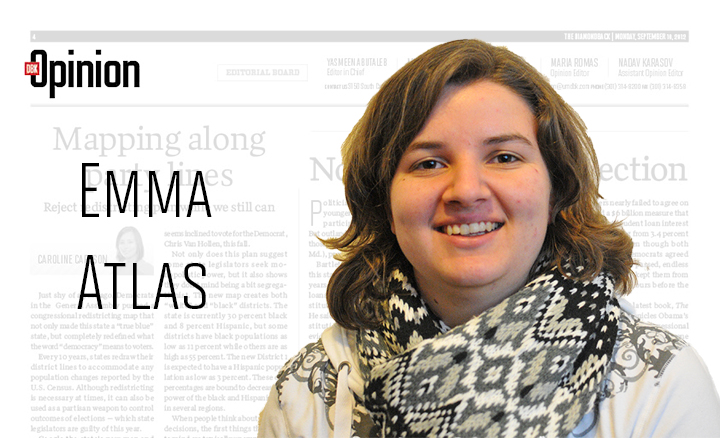
Senior government and politics major
My philosophy is one of equality. That is, I think everyone should have the right to have their neighbors spied on. A spy for a spy makes the whole world extremely not blind, as the saying goes. But that all-seeing eye has a cataract. For all our surveillance, nobody except officer Darren Wilson and witnesses at the scene in Ferguson, Missouri, will ever know exactly what happened on the day 18-year-old Michael Brown was killed.
There is no known footage of the shooting that has set the town on fire. As of yet, there is no decisive testimony, no justice in the eyes of the people protesting and, from what I see, no credibility in any police force not yet equipped with body-mounted cameras.
Reliance on police and witness testimony alone is not enough, and testimony in fatal excessive force cases is about as valid as actual fiction. Cameras aren’t just a “be nice” pressure on officers. They are incorruptible watchers-who-watch-the-watchmen.
Without a doubt, mandating that all officers wear cameras and record every minute of their workday would cut down on cases of excessive force, as well as make racial discrimination and abuses as transparent as everything else is in this country. I see no reason why a police officer should be able to pull over cars based on the ethnicity of the driver in privacy, while I have to worry about which threatening buzzwords will turn my Mother’s Day call into a party line.
Increased surveillance on the police isn’t only beneficial for citizens. Body-mounted cameras grant legitimacy and inarguable truth to police reports. It’s the same logic used in arguments about privacy: If the police aren’t doing anything wrong, then they have nothing to worry about. Unless patrol cars really are the font of personal revelation they are in crime dramas, nothing should be recorded between during an officer’s shift that he or she isn’t willing to answer for.
Already, the popularity of YouTube and the spread of smartphones are working as a stopgap. Videos of heated confrontations with less-than-professional police are alarmingly common, both because of the popularization of filming police officers and the frequency with which they seem to misbehave. It could be that these incidents only seem to happen so often because filming good cops generates less Web traffic, but the only way to know for sure would be to get the full data set. That’s more feasible than it sounds.
According to The Washington Post, the Pentagon gave almost half a billion dollars of repurposed military equipment to local law enforcement last year. This includes the armored Mine-Resistant Ambush Protected vehicles shown prominently in Ferguson coverage, the LRAD sound cannons for suppressing riots, and other tactical equipment.
A fleet of GoPros and a secure server for footage seems like an extremely trivial cost compared to this. The system as I see it would require police officers to wear the cameras on their chest the entire time they are on duty. At no time would they be allowed to turn it off, except in the bathroom, because lost footage while on patrol would be incredibly implicating. Just before they clock out, the officers would turn in their cameras for processing by an outside regulating agency. Or, with a little innovative push, the system could send footage into the Cloud as it’s recorded, preventing any of it from being lost because of camera damage.
It’s intrusive, they might say, too pervasive, or unnecessary. To that I say, so are police officers who won’t do everything in their power to prove they had a reason to shoot an unarmed man.
Emma Atlas is a senior government and politics major. She can be reached at eatlasdbk@gmail.com.



